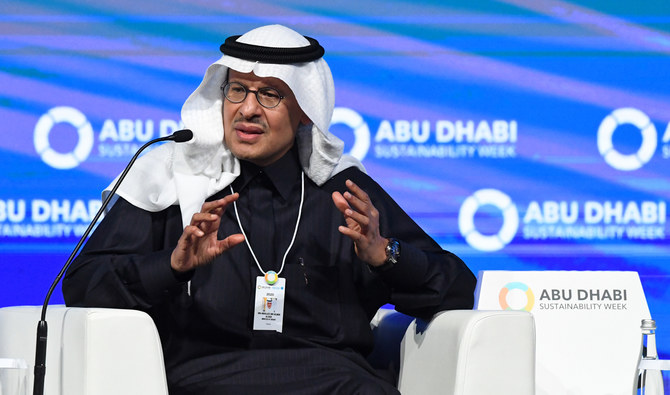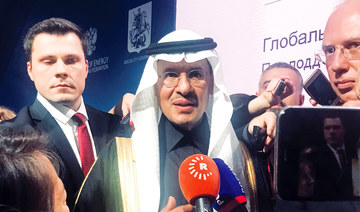ABU DHABI: Saudi Arabia is taking significant steps in shifting a part of its energy mix to renewables while reducing its carbon footprint, according to Prince Abdulaziz bin Salman Al-Saud, the Kingdom’s Minister of Energy.
Addressing the Future Sustainability Summit, a major event of the Abu Dhabi Sustainability Week (ADSW), on Tuesday in the UAE capital, Prince Abdulaziz highlighted the changes underway in Saudi Arabia and their importance to ongoing efforts to combat climate change.
“The first part of the preparation was to move from calling our Ministry of Oil to Ministry of Energy,” he said. “As a minister, I am honored to have full command of the ecosystem that is necessary for an energy strategy and its execution.
“So, as the Energy Minister of Saudi Arabia, I have no excuses for not developing and executing an energy strategy, with all the enablers that an energy minister could have at his disposal.”
Prince Abdulaziz shed light on the various ways in which Saudi Arabia intends to implement its strategy for developing a sustainable energy ecosystem.
“What Saudi Arabia is endowed with is somewhat different compared with other countries,” he said. “The holistic notion of the world energy market should always be present in devising your own energy mix and energy strategy.”
A country like Saudi Arabia, which is one of the largest energy exporters in the world, cannot disassociate itself from its domestic considerations when it comes to such matters, he said.
“The more renewables and gas we use for our local market and our own consumption, the more we will be freeing (up) liquids, which are exportable to the world’s oil markets,” he said.
“We are adding to the amount of oil available to us for export, but that is not the (only) incentive we have.
“We are building an energy strategy focused more on the most effective and economical energy mix for Saudi Arabia, free of any biases of any nature.”
Saudi Arabia is now looking at the economics of the issue as opposed to preconceived notions, Prince Abdulaziz said, adding that the optimal energy mix for the Kingdom is gas and renewables.
“Certain areas of Saudi Arabia will have to settle for liquids due to constraints of distance, space and the amount of consumption,” he said.
By 2030, however, Saudi Arabia will be developing its gas resources, he said, adding: “We will be quite big in terms of our renewables use. Local energy reforms will reduce domestic consumption by 2 million boe/d.”
Prince Abdulaziz described renewables as not only a source of energy but also as a valuable tool for diversification for the manufacturing sector.
“Our aspiration, in terms of renewables, be it solar or wind, is not just in fulfilling our own demand domestically, but also involving ourselves in manufacturing, with huge amounts of exports, and developing our local companies and industries to ensure they become as competitive as Masdar,” he said, referring to the prominent Abu Dhabi-based developer and operator of clean-energy projects.
“We have ACWA Power, and we will have more (companies) like it.”
Prince Abdulaziz added: “Primarily we want to do it with a view that people could give all sorts of energy a fair, equitable chance so long as we mitigate these emissions.
“It is equally important to be realistic about what sort of an energy mix the global economy will have. Right now, we have quite a few technologies that are in use, such as carbon sequestration, and the rate of evolution of that is impressive.”
In recent years, Saudi Arabia has introduced the concept of a circular carbon economy, which Prince Abdulaziz described as the right solution and a way forward for the Kingdom to advance the notion that, regardless of the source of energy used, mitigating and sequestering the impact of emissions is vital for combating climate change.
“We are actually going further than that and viewing carbon as a material that has value, that you can manufacture, make use of and monetize. It will be a win-win situation,” he said.
To this end, Saudi Arabia is working to a holistic plan through its National Energy Efficiency Program (NEEP), whereby it can become a model for efficient, sound and environmentally friendly energy production.
“It is extremely important, as a producer country, that we present ourselves as an efficient user of energy,” he said.
“But for that to happen, you must have price reform, and we now have a very effective Energy Pricing Reform Program, which will lend support to the NEEP.”
Prince Abdulaziz said the Kingdom is also transitioning towards a more energy-efficient vehicular fleet with the same efficiency level as that of its American counterpart by 2025.
For good measure, Saudi Arabia has changed its building codes to ensure new structures are more efficient, and all utilities are being converted to achieve the same objectives, he said, adding that manufacturers of equipment ranging from air conditioners to refrigerators are following suit.
More broadly, Prince Abdulaziz said, Saudi Arabia is looking forward to the conversion of its energy mix, whereby it will use more gas and renewables to become part of the solution.
“Primarily, we want to achieve it assuming that people have to give all sources of energy a fair and equitable chance as long as we mitigate these emissions,” he said.
“It is equally important to be realistic about what sort of energy mix the global economy will have.
"By 2040 we will still need a lot of oil, a lot of gas and coal and a lot of renewables.
“You cannot attend to the security of supply issue if you say I don't want to rely on Middle East sources of energy and at once want to achieve sustainability development goals."
As Saudi Arabia prepares to host the summit of G20 leaders in November this year, it is embracing the concept of a circular carbon economy, with the brightest scientists in the field working with the Kingdom, Prince Abdulaziz said.
“We are advancing and pushing it for G20, and we are receiving a good reception,” he said.
“We have a story to tell and we have a roadshow. We are willing to be proactively engaged in serious but objective discussions, not emotional debates.”
Prince Abdulaziz concluded his address by saying that Saudi Arabia and the UAE have the same hopes and aspirations as well as the same energy and environmental agenda.
“We really see eye to eye in what we do,” he said. “We are ready. Last year, the Kingdom reduced its emissions by 2.8 percent and ranked fourth in terms of reduction of emissions among G20 countries. If that’s not a way to demonstrate our commitment, I don’t know what else we can do.”
















